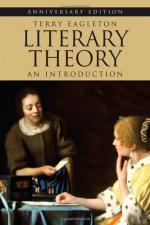
|
| Name: _________________________ | Period: ___________________ |
This quiz consists of 5 multiple choice and 5 short answer questions through Conclusion, Political Criticism.
Multiple Choice Questions
1. According to Eagleton, the French structural anthropologist Claude Levi-Strauss did pioneering work on what?
(a) Language.
(b) Myth.
(c) Religion.
(d) Philosophy.
2. According to Eagleton, Gibbon and the authors of Genesis share what in common?
(a) They both thought they were writing historical truth, but are read as fact by some and fiction by others.
(b) Both wrote historical truth that is read as fiction.
(c) Both wrote fiction that is read as fact by some and fiction by others.
(d) Both wrote fiction that is read as historical fact.
3. According to the Russian critic Roman Jakobson, literature represents "organized ______committed on ordinary _______."
(a) Religion; writing.
(b) Protest; speech.
(c) Violence; speech.
(d) Violence; people.
4. For the economist Eagleton discusses, "those economists who dislike theory or claimed to get along better without it" were what?
(a) In the grip of an older theory.
(b) Didn't understand the importance of theory.
(c) In the grip of the most current theory.
(d) Had no knowledge of any theory.
5. According to Eagleton, who would an ideal reader be for a structuralist?
(a) Someone who had intelligent codes at her or his disposal.
(b) Someone who had all the codes at her or his disposal.
(c) Someone who had the right codes at her or his disposal.
(d) Someone who didn't have any codes at her or his disposal.
Short Answer Questions
1. According to Eagleton, what kind of age do we live in, where "meaning, like everything else, is expected to be instantly consumable"?
2. What is the example Eagleton provides of a metalanguage, where one sign-system denotes another sign-system?
3. According to Eagleton, why is it an illusion to think that he can be present to us in what he says and writes?
4. According to Eagleton, what is the oldest form of literary criticism?
5. According to Eagleton, why is E.D. Hirsch able to maintain his view that literary meaning is absolute and resistant to historical change?
|
This section contains 415 words (approx. 2 pages at 300 words per page) |

|




